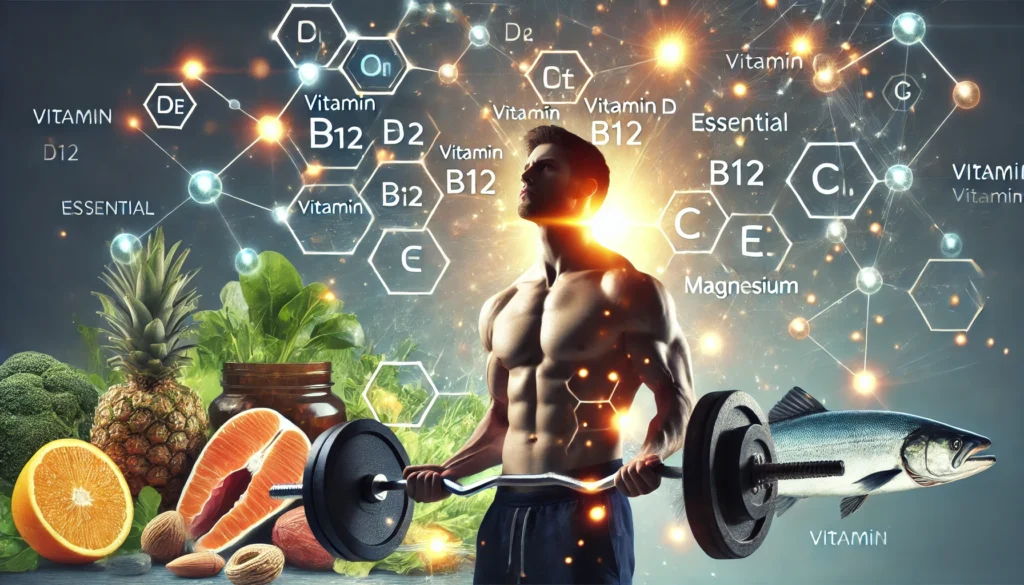Understanding the Importance of Vitamins for Men’s Health
Maintaining optimal health requires a well-balanced diet, consistent exercise, and sufficient sleep. However, many men overlook the essential role that vitamins play in their overall well-being. Vitamins support critical bodily functions, including energy production, immune defense, muscle strength, and cognitive function. As men age, their nutritional needs evolve, making it crucial to incorporate the right vitamins into their daily routine. With dietary gaps, stress, and lifestyle factors, supplementation becomes an essential consideration.
You may also like: Best Strength Training Routine for Men: How Prostate Health Supplements Support Muscle Recovery and Performance
Understanding what vitamin supplements men should take can be the key to achieving peak physical and mental performance. Nutrient deficiencies can lead to chronic fatigue, reduced muscle strength, poor metabolism, and a weakened immune system. In addition, men who engage in strength training and resistance workouts require adequate vitamin intake to support muscle repair and growth. This comprehensive guide explores the five essential vitamins for men, their benefits, the best sources, and how they contribute to long-term health.
Vitamin D: The Foundation for Bone and Muscle Strength
Vitamin D is one of the most crucial vitamins for men’s health. It plays a central role in calcium absorption, which directly impacts bone density and muscle function. Men who engage in strength training require adequate vitamin D to support muscle contraction and recovery. A deficiency in this vitamin has been linked to decreased testosterone levels, an increased risk of fractures, and weakened immune function.
Exposure to sunlight is the most effective way to obtain vitamin D naturally. However, factors such as limited sun exposure, winter months, and indoor work environments can lead to deficiencies. Dietary sources of vitamin D include fatty fish like salmon and mackerel, egg yolks, and fortified dairy products. Supplementation is often necessary to maintain optimal levels, especially for men who do not receive enough sunlight. Research suggests that men should aim for at least 600–800 IU per day, but those with deficiencies may require higher doses under medical supervision.
Vitamin D supplementation supports not only skeletal health but also cardiovascular function. Studies indicate that adequate vitamin D levels are linked to lower risks of hypertension and heart disease. Given its role in immune regulation, it also aids in defending the body against infections and inflammation. Ensuring sufficient vitamin D intake is essential for men looking to maintain strength, resilience, and overall health.
Vitamin B12: Enhancing Energy and Brain Function
Among the five essential vitamins for men, vitamin B12 stands out for its role in energy production and cognitive function. This water-soluble vitamin is vital for red blood cell formation, neurological health, and DNA synthesis. Men with low vitamin B12 levels often experience fatigue, weakness, memory issues, and difficulty concentrating.
Vitamin B12 is primarily found in animal-based foods such as beef, poultry, fish, and dairy products. This makes vegetarians and vegans more susceptible to deficiencies, necessitating supplementation. For men who follow plant-based diets, fortified foods and high-quality B12 supplements can help bridge the gap. The recommended daily intake for adult men is 2.4 mcg, though higher doses may be required for individuals with absorption issues or pernicious anemia.
Adequate vitamin B12 intake supports optimal nervous system function, reducing the risk of neurodegenerative diseases such as Alzheimer’s. It also plays a role in maintaining cardiovascular health by regulating homocysteine levels, which can impact heart disease risk. Given its significance in maintaining mental clarity and sustained energy, vitamin B12 is indispensable for men leading active and demanding lifestyles.

Vitamin C: Strengthening Immunity and Reducing Inflammation
Vitamin C is widely recognized for its immune-boosting properties. However, its benefits extend far beyond immune support. This powerful antioxidant aids in collagen production, which is essential for skin health, joint function, and tissue repair. Men who engage in regular exercise and strength training benefit from vitamin C’s ability to reduce oxidative stress and accelerate muscle recovery.
Citrus fruits, bell peppers, strawberries, and leafy greens are excellent dietary sources of vitamin C. Given its water-soluble nature, vitamin C must be consumed daily, as the body does not store excess amounts. The recommended intake for men is approximately 90 mg per day, with higher needs for athletes or individuals exposed to high levels of stress.
Vitamin C also contributes to cardiovascular health by supporting healthy blood vessels and reducing the risk of hypertension. Its anti-inflammatory properties aid in combating chronic diseases and improving overall longevity. By incorporating vitamin C into their daily regimen, men can enhance their resilience against illness while maintaining robust physical performance.
Vitamin E: Protecting Cellular Health and Enhancing Athletic Performance
Vitamin E is a potent antioxidant that plays a crucial role in protecting cells from oxidative damage. It supports cardiovascular health, strengthens the immune system, and aids in skin regeneration. For men who engage in resistance workouts, vitamin E helps reduce exercise-induced muscle damage and accelerates recovery.
Rich dietary sources of vitamin E include nuts, seeds, avocados, and vegetable oils. Despite its abundance in food, many men fail to meet their daily recommended intake of 15 mg. Given its role in combating free radicals, vitamin E supplementation may be particularly beneficial for athletes and individuals exposed to high levels of environmental stressors.
Research suggests that vitamin E can also support prostate health by reducing inflammation and oxidative stress. However, excessive supplementation should be avoided, as high doses have been associated with increased health risks. Striking a balance with dietary intake and moderate supplementation ensures optimal benefits for men aiming to maintain cellular integrity and athletic performance.
Magnesium: Optimizing Muscle Function and Heart Health
Magnesium is often overlooked but is among the most critical vitamins for men’s overall well-being. It is essential for muscle contraction, nerve function, and energy metabolism. Men who participate in weight training and high-intensity workouts require sufficient magnesium to prevent muscle cramps, improve endurance, and enhance recovery.
Dark leafy greens, nuts, whole grains, and legumes are excellent sources of magnesium. The recommended daily intake for men ranges from 400–420 mg. Unfortunately, many individuals fall short of meeting their magnesium needs due to modern dietary patterns and soil depletion. Supplementation can be particularly beneficial for men experiencing muscle fatigue, stress, or sleep disturbances.
Beyond its impact on muscle function, magnesium contributes to heart health by regulating blood pressure and reducing the risk of cardiovascular disease. It also supports brain function and mood stability, making it an essential nutrient for overall wellness. Ensuring adequate magnesium intake helps men maintain peak physical and cognitive performance.

Frequently Asked Questions (FAQ) on Men’s Vitamin Supplements
1. What vitamin supplements should men take for optimal health?
Choosing the right vitamin supplements is essential for maintaining overall health, supporting energy levels, and preventing deficiencies. The best approach is to focus on a combination of vitamins and minerals that cater to men’s specific needs, such as heart health, muscle function, and immune support. When considering what vitamin supplements should men take, experts often recommend vitamin D, magnesium, omega-3 fatty acids, and B vitamins. Each of these plays a crucial role in supporting different bodily functions, from bone density to cognitive health. Ensuring that your diet is rich in these nutrients, along with supplementation when necessary, can help maintain long-term well-being.
2. What vitamins should men take daily to support energy and metabolism?
For sustained energy and a well-functioning metabolism, men need a variety of essential vitamins. B vitamins, especially B6 and B12, are critical for converting food into usable energy and preventing fatigue. Vitamin C helps with the absorption of iron, which is vital for oxygen transport and endurance. Magnesium supports muscle function and relaxation, preventing cramps and fatigue. When considering what vitamins should men take daily, focusing on energy-boosting nutrients ensures a steady metabolism and better physical performance throughout the day.
3. What are the 5 essential vitamins for men and why are they important?
The 5 essential vitamins for men include vitamin D, magnesium, omega-3 fatty acids, B vitamins, and zinc. Vitamin D is crucial for bone health and testosterone production, while magnesium aids in muscle function, sleep, and relaxation. Omega-3 fatty acids reduce inflammation and support heart health, making them a vital addition to a man’s daily regimen. B vitamins help with energy production, while zinc plays a role in immune function and testosterone balance. Ensuring you receive these 5 essential vitamins for men can improve overall health and reduce the risk of common deficiencies.
4. How do vitamin supplements support men’s immune health?
A strong immune system relies on adequate intake of vitamins and minerals that help the body fight infections and reduce inflammation. When considering what vitamin supplements should men take for immune support, vitamin C and vitamin D are among the most critical. Zinc is another important mineral that enhances immune response and aids in wound healing. Omega-3 fatty acids also play a role in regulating the immune system and reducing chronic inflammation. By incorporating these nutrients into a daily routine, men can maintain a robust immune defense year-round.
5. What vitamins should men take daily to support heart health?
Heart disease remains one of the leading health concerns for men, making heart-supportive vitamins essential. When evaluating what vitamins should men take daily for heart health, omega-3 fatty acids, magnesium, and CoQ10 are excellent choices. Omega-3s reduce inflammation and support healthy cholesterol levels, while magnesium helps regulate blood pressure. CoQ10 plays a crucial role in cellular energy production and can enhance cardiovascular function. Including these nutrients in a daily supplement routine can contribute to long-term heart health and lower the risk of cardiovascular disease.
6. Do men need different vitamins at different life stages?
Yes, men’s vitamin needs change as they age, requiring adjustments to supplementation over time. Younger men may benefit from higher doses of B vitamins and magnesium for energy and muscle recovery. Middle-aged men should focus on the 5 essential vitamins for men, including vitamin D and omega-3 fatty acids, to support heart and bone health. Older men may require additional zinc and vitamin B12 to maintain immune function and cognitive health. Adjusting supplementation based on life stage ensures that men receive the right nutrients to support their body’s evolving needs.
7. What vitamin supplements should men take for muscle recovery and strength?
Muscle recovery and strength require a balanced intake of protein-building and anti-inflammatory nutrients. When looking at what vitamin supplements should men take for optimal muscle function, magnesium, vitamin D, and omega-3 fatty acids stand out. Magnesium helps relax muscles and prevent cramps, while vitamin D supports bone and muscle strength. Omega-3s help reduce post-workout inflammation, aiding in faster recovery. Supplementing with these essential nutrients can enhance athletic performance and promote muscle maintenance as men age.
8. What are the best vitamins for men to support cognitive health?
Cognitive function relies on a steady intake of brain-supportive vitamins and minerals. When considering what vitamins should men take daily for brain health, omega-3 fatty acids, vitamin B12, and vitamin D are essential. Omega-3s, particularly DHA, support memory and cognitive function, while B12 prevents neurological decline. Vitamin D plays a crucial role in mood regulation and mental clarity. Regular supplementation of these vitamins can help reduce the risk of cognitive decline and improve overall brain health.
9. How should men choose high-quality vitamin supplements?
With so many options available, selecting high-quality vitamin supplements is key to ensuring effectiveness. When evaluating what vitamin supplements should men take, look for third-party tested brands that verify ingredient purity. Avoid supplements with artificial additives, excessive fillers, or unverified claims. Choosing whole-food-based vitamins can improve nutrient absorption and reduce potential side effects. Consulting a healthcare provider before starting any new supplement regimen ensures that choices align with individual health needs.
10. Can taking too many vitamins be harmful to men’s health?
While vitamins are essential for health, excessive intake of certain nutrients can cause adverse effects. For example, excessive vitamin D can lead to calcium buildup, affecting kidney function. High doses of vitamin A can be toxic over time, while too much zinc may interfere with copper absorption. When considering what vitamins should men take daily, it is crucial to adhere to recommended dosages and avoid megadosing. Moderation, combined with a balanced diet, is key to safely optimizing vitamin intake.

Conclusion: Prioritizing Essential Vitamins for Long-Term Health
Understanding what vitamins men should take daily is crucial for achieving and maintaining optimal health. The five essential vitamins for men—vitamin D, vitamin B12, vitamin C, vitamin E, and magnesium—play fundamental roles in supporting strength, energy, and overall well-being. Given the demands of modern lifestyles, supplementation may be necessary to address dietary gaps and ensure adequate nutrient intake.
Incorporating these vitamins into a well-balanced diet, alongside consistent exercise and healthy habits, promotes longevity and resilience. Men looking to optimize their physical and mental performance should pay attention to their vitamin intake and seek professional guidance when needed. By making informed choices, men can take proactive steps toward long-term health and vitality.
men’s health supplements, daily multivitamins for men, essential nutrients for men, best men’s vitamins, vitamins for energy and metabolism, immune support for men, heart health vitamins, brain health supplements, men’s wellness routine, optimal nutrition for men, vitamins for muscle recovery, healthy aging for men, men’s bone health, natural supplements for men, daily nutrition for men, men’s fitness and vitamins, best minerals for men, stress relief supplements, metabolism boosters for men, cognitive support for men
Further Reading:
11 Vitamins and Supplements That Boost Energy
The best vitamins and supplements for energy
8 Essential Vitamins and Minerals for Men: A Complete Guide to Staying Healthy
Disclaimer
The information contained in this article is provided for general informational purposes only and is not intended to serve as medical, legal, or professional advice. While Health11News strives to present accurate, up-to-date, and reliable content, no warranty or guarantee, expressed or implied, is made regarding the completeness, accuracy, or adequacy of the information provided. Readers are strongly advised to seek the guidance of a qualified healthcare provider or other relevant professionals before acting on any information contained in this article. Health11News, its authors, editors, and contributors expressly disclaim any liability for any damages, losses, or consequences arising directly or indirectly from the use, interpretation, or reliance on any information presented herein. The views and opinions expressed in this article are those of the author(s) and do not necessarily reflect the official policies or positions of Health11News.


